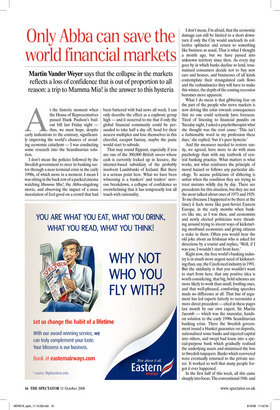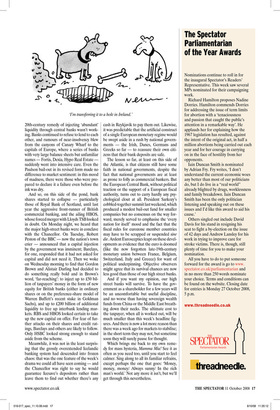Only Abba can save the world financial markets
Martin Vander Weyer says that the collapse in the markets reflects a loss of confidence that is out of proportion to all reason: a trip to Mamma Mia! is the answer to this hysteria At the historic moment when the House of Representatives passed Hank Paulson’s bailout bill last Friday night — thus, we must hope, despite early indications to the contrary, significantly improving the world’s chances of avoiding economic cataclysm — I was conducting some research into the Scandinavian solution.
I don’t mean the policies followed by the Swedish government to steer its banking sector through a near-terminal crisis in the early 1990s, of which more in a moment. I mean I was sitting in the back row of a packed cinema watching Mamma Mia!, the Abba-singalong movie, and observing the impact of a mass inoculation of feel-good on a crowd that had been battered with bad news all week. I can only describe the effect as a euphoric group high — and it occurred to me that if only the global financial community could be persuaded to take half a day off, head for their nearest multiplex and lose themselves in this cheerful, escapist fantasy, maybe the panic would start to subside.
That may sound flippant, especially if you are one of the 300,000 British savers whose cash is currently locked up in Icesave, the internet-based subsidiary of the probably insolvent Landsbanki of Iceland. But there is a serious point here. What we have been witnessing is a bankers’ and traders’ nervous breakdown, a collapse of confidence so overwhelming that it has temporarily lost all touch with rationality. I don’t mean, I’m afraid, that the economic damage can still be limited to a short downturn if only the City would unclench its collective sphincter and return to something like business as usual. That is what I thought a month ago, but we have passed into unknown territory since then. As every day goes by in which banks decline to lend, traumatised consumers decide not to buy new cars and houses, and businesses of all kinds contemplate their strangulated cash flows and the redundancies they will have to make this winter, the depth of the coming recession becomes more apparent.
What I do mean is that gibbering fear on the part of the people who move markets is now driving this crisis towards consequences that no one could seriously have foreseen. Tired of listening to financial pundits on Tuesday night, I asked a psychotherapist what she thought was the root cause: ‘This isn’t a fashionable word in my profession these days,’ she replied, ‘but it’s pure hysteria.’ And the measures needed to restore sanity, we agreed, have more to do with mass psychology than with any textbook of central banking practice. What matters is what works, not what reinforces the principle of moral hazard or follows any particular ideology. To accuse politicians of dithering is unfair when the condition they are trying to treat mutates wildly day by day. There are precedents for this situation, but they are not the most talked-about ones of 1973 and 1929. To me (because I happened to be there at the time) it feels more like post-Soviet Eastern Europe, in the early months when bankers like me, as I was then, and economists and newly elected politicians were thrashing around trying to invent ways of kickstarting moribund economies and giving citizens a stake in them. Often you would hear the old joke about an Irishman who is asked for directions by a tourist and replies, ‘Well, if I was you, I wouldn’t start from here.’ Right now, the free world’s banking industry is in much more urgent need of kickstarting than, say, the Czech steel industry in 1991. But the similarity is that you wouldn’t want to start from here, that any positive idea is worth considering, that big, bold schemes are more likely to work than small, footling ones, and that well-phrased, comforting speeches made no difference at all. That line of argument has led experts latterly to reconsider a more direct precedent — cited in these pages last month by our own expert, Sir Martin Jacomb — which was the muscular, handson solution to the early 1990s Scandinavian banking crisis. There the Swedish government issued a blanket guarantee on deposits, nationalised some banks and injected capital into others, and swept bad loans into a special-purpose bank which gradually realised the underlying assets and minimised the loss to Swedish taxpayers. Banks which recovered were eventually returned to the private sector. It worked so well that many people forgot it ever happened.
In the first half of this week, all this came sharply into focus. The conventional 19thand 20th-century remedy of injecting ‘abundant’ liquidity through central banks wasn’t working. Banks continued to refuse to lend to each other, and rumours of near-insolvency blew from the canyons of Canary Wharf to the capitals of Europe, where a series of banks with very large balance sheets but unfamiliar names — Fortis, Dexia, Hypo Real Estate — suddenly went into intensive care. Even the Paulson bail-out in its revised form made no difference to market sentiment: in this mood of madness, there were those who were prepared to declare it a failure even before the ink was dry.
And so, on this side of the pond, bank shares started to collapse — particularly those of Royal Bank of Scotland, until last year the aggressive front-runner of British commercial banking, and the ailing HBOS, whose forced merger with Lloyds TSB looked in doubt. On Monday night, we heard that the major high-street banks were in conclave with the Chancellor. On Tuesday, Robert Peston of the BBC — now the nation’s town crier — announced that a capital injection by the government was imminent; Barclays, for one, responded that it had not asked for capital and did not need it. Then we woke on Wednesday morning to find that Gordon Brown and Alistair Darling had decided to do something really bold and in Brown’s word, ‘far-reaching’: to inject up to £50 billion of taxpayers’ money in the form of new equity for British banks (either in ordinary shares or on the preference-share model of Warren Buffett’s recent stake in Goldman Sachs), and up to £200 billion of additional liquidity to free up interbank lending markets. RBS and HBOS looked certain to take up the new capital on offer. For fear of further attacks on their shares and credit ratings, Barclays and others are likely to follow. Only HSBC looked strong enough to stand aside from the scheme.
Meanwhile, it was not in the least surprising that the grossly overextended Icelandic banking system had descended into frozen chaos: that was the one feature of the week’s drama we could all have seen coming — and the Chancellor was right to say he would guarantee Icesave’s depositors rather than leave them to find out whether there’s any cash in Reykjavik to pay them out. Likewise, it was predictable that the artificial construct of a single European monetary regime would be swept aside in a rush by national governments — the Irish, Danes, Germans and Greeks so far — to reassure their own citizens that their bank deposits are safe.
The lesson so far, at least on this side of the Atlantic, is that citizens still have some faith in national governments, despite the fact that national governments are at least as prone to folly as commercial bankers. But the European Central Bank, without political traction or the support of a European fiscal authority, turns out to carry hardly any psychological clout at all. President Sarkozy’s cobbled-together summit last weekend, which produced a modest bail-out fund for smaller companies but no consensus on the way forward, merely served to emphasise the ‘every nation for itself’ mood and the fact that the fiscal rules for eurozone member countries may have to be scrapped or suspended sine die. Ardent Eurosceptics leapt on these developments as evidence that the euro is doomed (like the now forgotten late-19th-century monetary union between France, Belgium, Switzerland, Italy and Greece) for want of political underpinning. Objective observers might agree that its survival chances are now less good than those of our high street banks.
And if you want my opinion, our high street banks will survive. To have the government as a shareholder for a few years will be an uncomfortable but useful discipline, and no worse than having sovereign wealth funds from China or the Middle East breathing down their necks. The ultimate cost to the taxpayer, when all is worked out, will be much smaller than this week’s headline figures. And there is now a lot more reason than there was a week ago for markets to stabilise; in the short term they may not, but sometime soon they will surely pause for thought.
Which brings me back to my own remedy for mass hysteria, Mamma Mia! See it as often as you need too, until you start to feel calmer. Sing along to all its familiar refrains, except perhaps the one that goes: ‘Money, money, money/ Always sunny/ In the rich man’s world.’ Not any more it isn’t, but we’ll get through this nevertheless.











































































 Previous page
Previous page